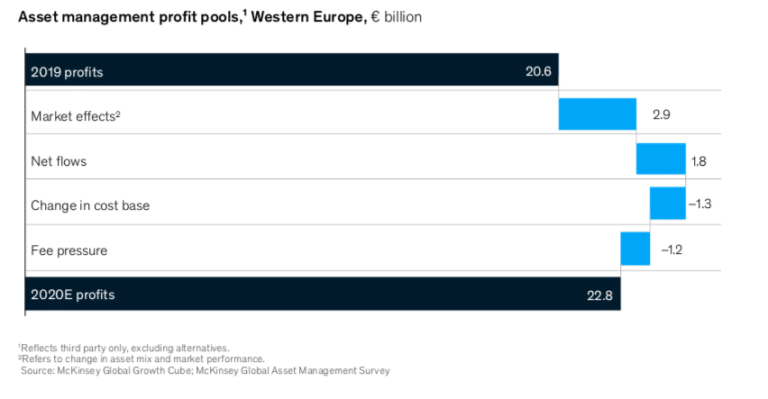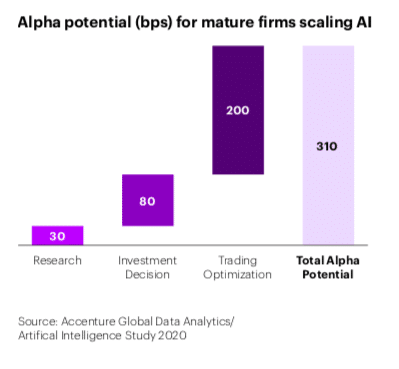European fund managers could make €15bn ($17.8bn) in incremental profits via capitalizing on economies of scale and greater control over costs, according to McKinsey & Company.
The consultancy said in a report, European asset management after an unprecedented year, that the region’s buy side has not been able to exploit the operating leverage once thought to be a fundamental feature of the business, even though results held up fairly well in the dislocation and volatility caused by the Covid-19 pandemic.
“Looking within these numbers, however, the absolute cost pool grew at 4.2% for 2020,” said the report. “This highlights how heavily the industry’s profitability relies on rising markets.”
One recommendation for asset managers to recapture inherent operating leverage is to focus on environmental, social and governance strategies.
Europe has far more funds that are considered “sustainable” than any other region and asset managers need to show leadership in guiding Europe to an even greener path and improved sustainability.
McKinsey said: “Asset managers should establish a leading position by supporting the initiatives established by governments and the many NGOs and industry groups focused on climate change to meet the net zero carbon objectives. They also should steer capital flows in the most productive and sustainable directions.”

The consultancy continued that well-defined ESG strategies should be incorporated into every phase of the investment process, including prioritizing the investments to be made and ensuring adherence to principles of the ESG mission.
In order to take on this responsibility asset managers will need to change their internal structures by strengthening diversity and inclusion in their leadership ranks, emphasizing the “social” of ESG policy, and by calling for fairness in labor issues as well as workplace health and safety.
Embrace technology disruptions
The shift to remote working in response to COVID-19 is a harbinger of technological change over the next decade according to McKinsey.
“The road forward for asset managers should include a transformation toward organizations that are adaptive and continually learning,” said the report.

Asset managers should commit fully to improving efficiency through using advanced analytics and artificial intelligence at scale throughout their organisations; radically upgrading customer experience in both retail and institutional sectors; launching digital businesses; and building new digital capabilities for investment themes and new asset classes.
“As capital markets firms, fund administrators, and custodians deploy distributed ledger technologies, it could become the primary front-to-back messaging technology in asset management within ten years,” added McKinsey. “In addition, the tokenization of assets enables digital trading and helps to “liquidize” traditionally illiquid assets such as art or real estate, opening investments in these assets to a much broader customer group.”
Accenture
Accenture also said in a study, Future of Asset Management, that the buy side needs to use automation, artificial intelligence and analytics for product development, alpha generation and to deliver client experience in order to create differentiation by 2025.
The consultancy said in May that nearly all, 95%, of respondents believe that an asset manager’s technology, data and digital capabilities will be differentiators by 2025. Respondents said internal technology was the most important factor for the successful asset manager in 2025, even more than ESG products, advice and exchange-trade funds.
However the survey found that many asset managers are still in early stages with many emerging technologies, including AI. Accenture said: “Our survey found that 72% of asset managers do not view themselves as leading firms when assessing their digital maturity.”
As a result fund managers have been making fintech acquisitions. The report cited Invesco’s acquisition of JemStep (now Intelliflo), one of the first online automated investment platforms in financial services and Schwab buying Motif, which uses data science to offer personalized investments and supports direct indexing.
The industry’s primary focus for investment capabilities will be on data and advanced technologies. Accenture found that mature firms who industrialized and scaled AI across the investment process cited up to 300 basis points of alpha collectively.
“Analytics and AI apps will become as prevalent, intelligent and user-friendly as spreadsheet and search software,” added the report. “Adoption of AI will increase in capital markets as it relates to more qualitative investment decision-making.”

For example, in equities firms can use AI to anticipate equity performance before quarterly reports or earnings announcements, which can generate 10 to 50 basis points of alpha.
Nearly all, 92%, of investment managers believe that alternative data enhances due diligence on public and private investments and 40% intend to increase their processing of new forms of data to generate insights. Accenture gave the example of one firm using alternative data to analyze job postings, as well as employment and unemployment data, to create their own datasets on company performance.
Products
The majority, 79% of asset managers expect the “purpose economy/purpose investing” to grow as many consumers want at least part of their portfolio invested in companies that promote ESG goals.
Asset managers should therefore introduce sustainability practices into their data strategy to ensure that consistent standards are applied to both non-financial and financial investment decisions.
“The market for ESG data will grow, bringing a wide range of complexity and granularity issues to which firms should adapt,” said Accenture. “A robust data governance model will also be required—one built on a strong IT and data foundation to enable scalability.”
Mutual funds currently have three times the assets of ETFs but Accenture said they are beginning to lose ground to emerging products such as collective investment trusts, active ETFs and direct indexing. Three quarters, 76%, of asset managers believe that direct indexing will become a more popular investment strategy over the next five years.
In addition a broad movement in capital markets in moving toward tokenization of traditional securities and cash so nearly all, 79%, of asset managers are exploring crypto-based and decentralized finance products.
“The implications of tokenization for the asset management community are centered on the movement from clearing free of payment to an accelerated settlement that could include integrated cash settlement,” said Accenture. “Being a ‘fast follower’ is not likely to be a winning strategy. Firms will need to jump into the ring and take action.”
The McKinsey report was a collaborative effort by Sid Azad, Pierre-Ignace Bernard, Cristina Catania, Martin Huber, Niklas Nolzen, and Christian Zahn.
